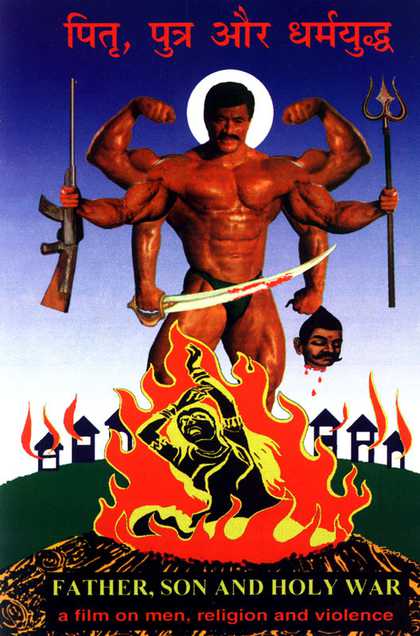Pitr, Putr Aur Dharmayuddha / Father, Son and Holy War
India 1995, video, 120 min, Hindi, English subtitles
The ominous flickering rustle of flames recurs throughout Father, Son and Holy War which begins at night, with silhouettes and shadows moving around distant flames burning the shops of Muslims in Bombay in the post-Babri mosque riots of late 1992. On the soundtrack, an anonymous arsonist, prompted by Patwardhan asks: ‘How do I feel? I’m having fun. We got a holiday from the shop and enjoyed ourselves. We destroyed 4 or 5 shops’. In daylight, people walk past a charred corpse resting on the street, its arms outstretched. Youth crowd into Patwardhan’s camera, exulting in their deeds. A moustachioed man looks away from the camera with a sated expression. He tells Patwardhan to tell Prime Minister Rao to ‘wear a sari.’ Another says: ‘Wearing saris is a sin.’ What started as an ‘enquiry into religious violence’, Patwardhan observes, has become an enquiry into ‘a crisis of male identity.’ In this hostile environment, argues critic Geeta Kapur, women appear as the ‘lean survivors of an unholy war raging in the streets of urban India.’ Although it was completed in 1995, Father, Son and Holy War was not broadcast until 2006. After defeating the Central Board of Film Certification’s attempts to censor the film, Patwardhan fought a series of legal battles against the national broadcaster Doordashan at the Bombay High Court in 1998, 2001 and 2003. In 2006, the Supreme Court ordered the multiple award winning documentary to be screened, rejecting the broadcaster’s opinion that the film ‘has nothing specific to convey.’
Curated by The Otolith Collective. Followed by response and audience discussion with Shirin Rai, Anand Patwardhan, Kodwo Eshun and Anjalika Sagar.
Shirin M. Rai is Professor in the Department of Politics and International Studies at Warwick University and Visiting Professorial Fellow at the Gender Institute, London School of Economics. Her research focuses on gendered performance, political institutions and the political economy of development. She is author of The Gender Politics of Development 2008, and editor of Ceremony and editor of Ritual in Parliament 2010.
- Download the programme notes [PDF, 5.8 Mb]

